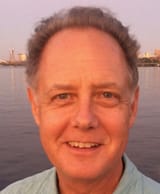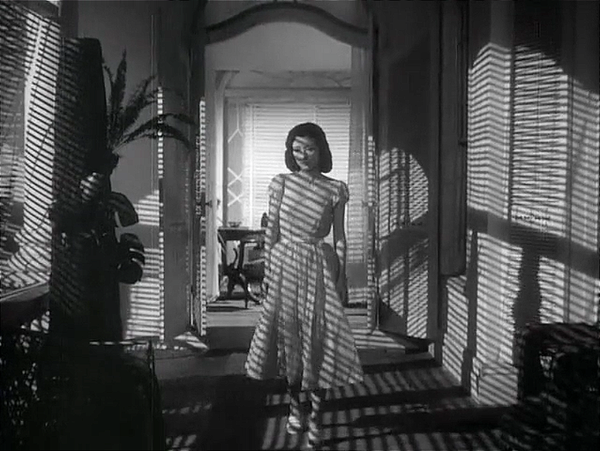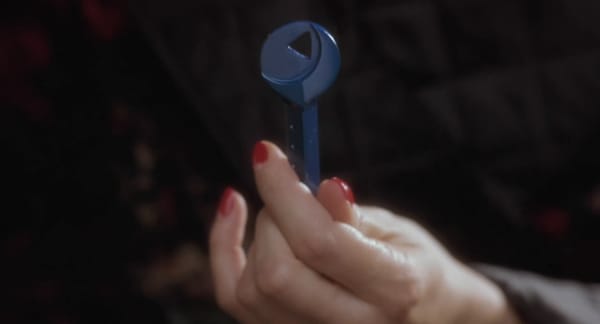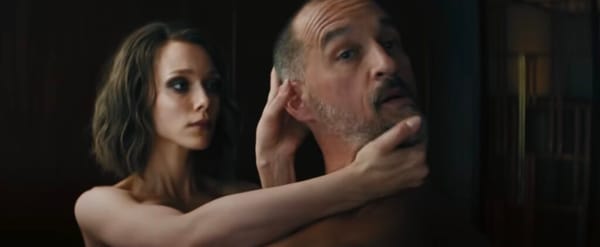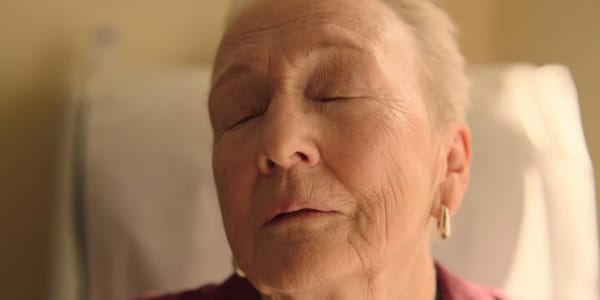"Vengeance" Is His
A Q&A with actor-writer-director B.J. Novak

B.J. Novak is in his early 40s now, but he still has the wry, flexible certainty of a smart kid itching to take on the world. He has one of those faces that pop up in the culture like a Whac-A-Mole. Where have you seen this guy before? Ah, right, “The Office” (2005-2013), on which he wrote, produced, and co-starred as Ryan Howard, the slippery Dunder Mifflin employee with the ever-changing personal grooming regimen. He was “Little Man” Utivich, one of the Inglourious Basterds in the Quentin Tarantino film of the same name. Novak has performed stand-up comedy and he’s written, directed, and executive produced a half-hour anthology series, “The Premise,” for FX. He has also written a book of deadpan short – sometimes very short – stories called “One More Thing,” and a best-selling children’s picture book called “The Book with No Pictures.” He has voiced a Smurf. Not once, but twice. He’s a Renaissance Guy.
The logical progression of such a career path – in Hollywood, anyway – is toward writing and directing a feature film, and with “Vengeance” Novak has dutifully stepped up. It’s a fish-out-of-water comedy, a Western thriller, a culture-clash drama, and some kind of reckoning for its central character if not its creator, who, to be honest, are nearly the same thing. Novak plays Ben Manalowitz (the star’s real first and almost his middle name), a callow New Yorker and wannabe podcaster who gets guilted down to rural Texas for the funeral of a woman he briefly dated and barely remembers but whose family is convinced he was The One. It’s all very awkward until the dead girl’s brother (Boyd Holbrook) lets slip she might have been murdered, at which point Ben sees a true-crime podcast materialize before his eyes and pitches it to his producer (Issa Rae) in New York. The movie gets weirder, funnier, and darker from there – and then a possibly villainous Ashton Kutcher shows up in a cowboy hat.
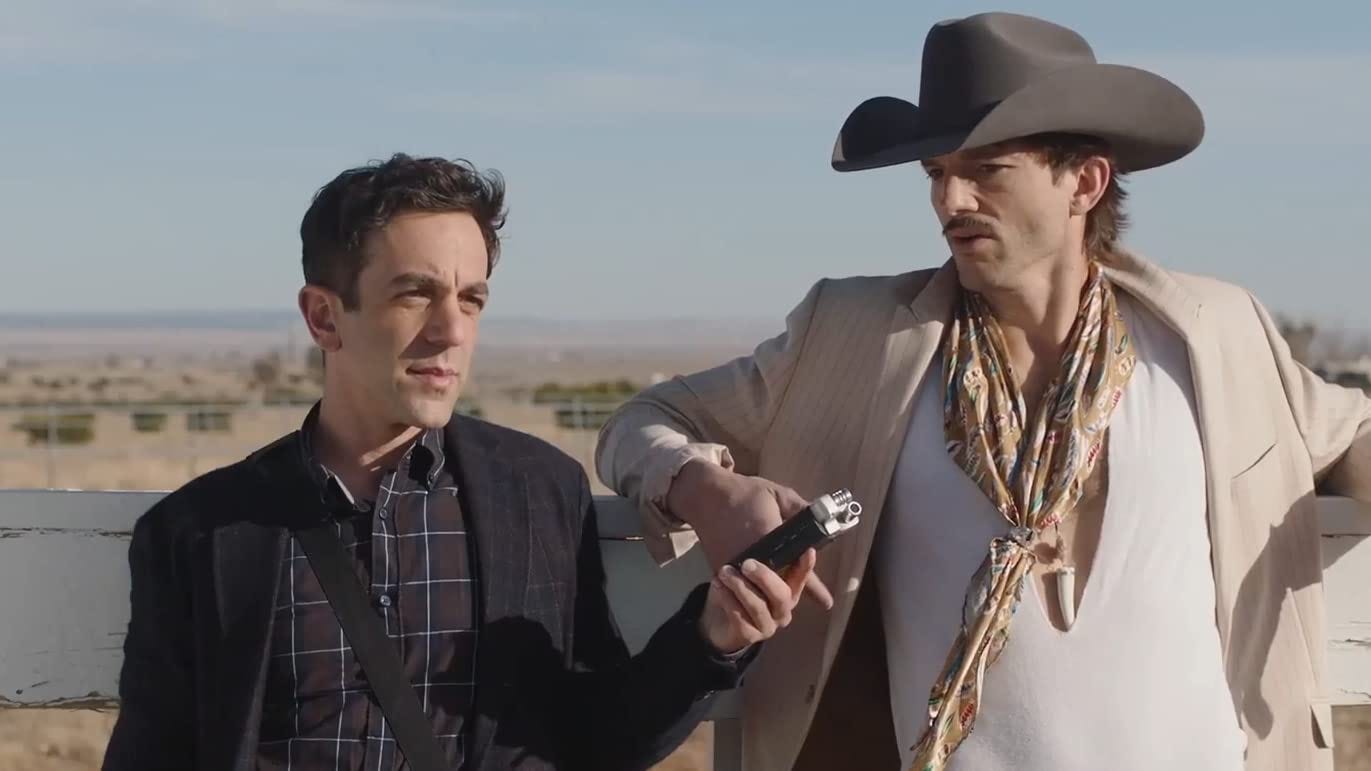
Prior to the theatrical debut of “Vengeance” this Friday, Novak has been hitting the PR hustings, and as he passed through his old home turf of Boston – he grew up in the upscale suburb of Newton and attended Newton South High School with his “Office” co-star John Krasinski – I took some time to talk with him about what he had in mind with this latest career move and what happens when an ambitious, dryly humorous guy from bluer-than-blue Massachusetts decides to make a movie about Texas. Following is a lightly edited version of the conversation.
Ty Burr
You’ve got such an interesting career, and I’m wondering how much of this was intentional. What was the career plan? I’m wondering if you’re one of these Newton South kids that just, like, had it all figured out.
B.J. Novak
I did. And it was this. No, I’m one of the many people in my generation who saw “Pulp Fiction” at the Cleveland Circle Theater at age 14 and thought, That’s what I’m going to do. I’m going to be a filmmaker. I’m going to be a writer-director. And then I also liked acting.
Ty Burr
Theater kid.
B.J. Novak
Yeah, theater kid. And then I became more of a writer. Later, when I started writing, as I tried to write screenplays, I was stuck on a pretty weak sitcom. [Ed.: That would be “Raising Dad,” a Bob Saget show that aired on The WB for one season in 2001.]
Ty Burr
This is after college.
B.J. Novak
This is after college. And I noticed that the writers had all been stand-ups. The only people I really wanted to be were Jonathan Katz, who created the show, phoned in once a week, and everyone revered, and Bob Saget, who drove up in his million-dollar Mercedes in sunglasses, cracked a couple of jokes, everyone kissed his ass, and then he zoomed off.
Ty Burr
Nice life.
B.J. Novak
I thought, these are the only two people I want to be, and they’re successful stand-ups, so I’ve got to become a successful stand-up. So I started doing stand-up and casting directors noticed because they asked, Who’s the stand-up? Then I got cast on the show “Punked,” and people asked for a head shot. And I thought, Okay, I’ve always wanted to act. Who would say no to this? So I started acting. And then acting and writing on “The Office,” and of course I’m not going to leave that job. Then after “The Office,” I was burnt out and had to find my voice again and wrote a book of short stories. And then wrote a children’s book on a whim, and that was a great detour as well. And then finally it was time to try to be Quentin Tarantino. This was the plan – the other stuff was not.
Ty Burr
I’ve seen the book compared to Woody Allen’s early humor books, “Without Feathers” and “Side Effects,” and I’m wondering if that was an influence, or if there was any other career that you looked at and said, Oh, I want that.
B.J. Novak
It was Tarantino initially, but I also loved Steve Martin’s career. Really, I liked different people’s careers for different reasons. Terry Southern, I really liked his career. And I guess as someone who thinks I’d like books to be a big part of what I do, I think Terry Southern is a great role model, in that his books were not side projects, and neither were his movies, and yet they weren’t all the same body of work either.
Ty Burr
What’s your favorite thing of his?
B.J. Novak
Terry Southern? “Candy” is absolutely a masterpiece to me. Beyond. And I also love “The Magic Christian.” It’s hard to separate his exact screenwriting accomplishments, but they’re certainly cool credits. My favorite thing about Terry Southern is that he is on the cover of “Sgt. Pepper,” and he’s the only one wearing sunglasses. That’s how fucking cool he is.
Ty Burr
How did you get to the new film?
B.J. Novak
I wrote three features at the same time, and I may hopefully get a chance to make the other two someday. But this one popped to the front of the line because I had lunch with Cooper Samuelson, an executive at Blumhouse, who said, What are you working on? And I named these three movies, and from the title alone, he said, Let’s do “Vengeance.” So I thought, Okay. If Blumhouse will make “Vengeance,” that was perfect because I admired “Get Out” so much.
Ty Burr
What was the idea that germinated “Vengeance”? What did you start with?
B.J. Novak
I started with regret. I started with regret over a relationship where I had not paid attention until after the fact. It’s something you can’t get over, so you have to do something because you can’t go backwards. I thought, Vengeance is reckoning with regret, so how would a person in my situation end up in a vengeance story about it? Avenging the death of a girl that you didn't pay attention to. I thought, Well, that's very funny to get roped into. And it's also funny if he ends up doing it.
Ty Burr
What about the podcast aspect of the main character?
B.J. Novak
He started out as a journalist. I was writing about a journalist.
Ty Burr
Not as funny.
B.J. Novak
Not as funny. This was five years ago or so, and I thought, all of a sudden, He’ll be a podcaster, that’s funny. That is funny. And the idea that he's an aspiring podcaster, that makes me laugh even more. He’s a guy who thinks he’s pretty cool, right? At the end of the day, he’s just a white guy in Brooklyn who can’t even make a podcast.
Ty Burr
Of which there are many. But he’s also got your name.
B.J. Novak
Yeah, my name and my grandfather’s pre-Ellis Island name.
Ty Burr
Wow. What’s that about?
B.J. Novak
To just keep it very personal, to remind myself to put my whole self into it. I was called Ben, which is what my family called me.
Ty Burr
When did you become B.J. — at school?
B.J. Novak
5th, 6th grade.
Ty Burr
On purpose?
B.J. Novak
Yeah. It was like a stage name. I thought it sounded more famous. I wasn’t wrong!
Ty Burr
I guess that worked out.
B.J. Novak
Well, there’s pros and cons there.
Ty Burr
Let me ask you about Texas. So what do you know about Texas?
B.J. Novak
I know more than a tourist and less than a local.
Ty Burr
What made you decide to set the film there?
B.J. Novak
At first I was thinking, Okay, well, Ben is pulled out of his comfort zone. It’s probably some tiny town in Middle America. And I looked at the map, and there’s Texas taking up most of the space. And at first I thought, That’s too obvious, too on the nose, Texas. What the hell is Texas, anyway? I know the mythology, I know the Westerns. But I looked it up, and right there on the Wikipedia page they were talking about the Alamo, which is this formative vengeance story. So I was like, Well, if I can really discover what I think it means, that will be just a better movie.
Ty Burr
You did research?
B.J. Novak
I did a lot of research. My assistant at the time opened up a Gmail account and I posted on Twitter, Can anyone show me around this or that region of Texas? They all wrote to her, and Ava, my assistant, she vetted who sounded crazy and who sounded legitimate. I have a friend in Dallas, Willie Decker, and we met up with the people that said they would show us around and did. I went from Dallas to Fort Worth to Abilene, to Merkel, to Alpine, Andrews, and a few other towns. Pecos, Texas, was where I really found the heart of the movie.
Ty Burr
How so?
B.J. Novak
Pecos was bleak and proud. It was remote. And someone quoted me the line, an old line, “There’s no law west of the Rio Grande and no God west of Pecos.” It felt very, very far away, and it looked brown and bright at the same time, which is how I wanted the movie to look.
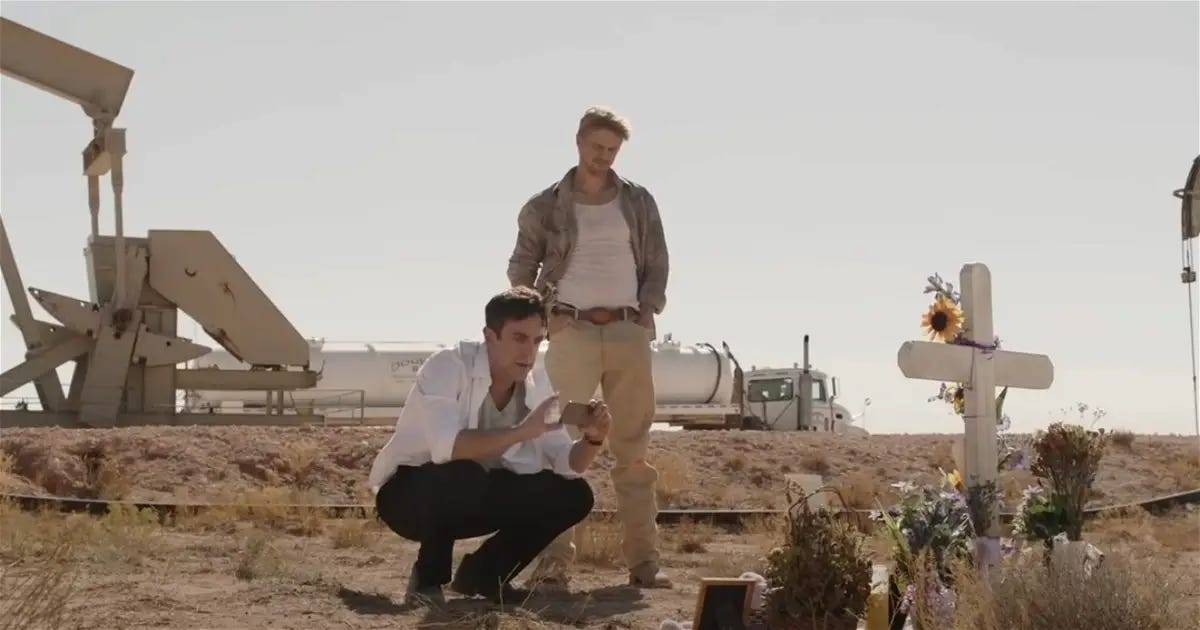
Ty Burr
What ingrained myths about red-state life were dispelled for you?
B.J. Novak
I think the friendliness was a surprise. Every single time I went there I thought, They’re going to look at this East Coast Jewish Hollywood guy wearing what they call “skinny jeans” – which are relaxed fit jeans, but they’re not Wranglers – they’re going to look at me and make me feel pretty damn uncomfortable. And it was the opposite. I’m sure they saw who I was, but the warmth and family spirit, how I was welcomed everywhere I went, was like nothing I’d experienced. I’ve traveled a lot for stand-up and other reasons, but I was treated more like family anywhere I went in Texas than anywhere else, even though the appearance of it was what I expected. It was big guys, big trucks, big guns. And I would say also the artistic culture is as big as it is anywhere, but not on the surface. Everyone in their family, every cop and sheriff, had a son or a nephew or a niece or a daughter who was an artist or a musician or a poet. When they showed me their work, it was astounding. But they don’t think of it as an identity there. It’s something they do quietly.
Ty Burr
What do you want audiences to come away from this movie thinking about Texas or about anything?
B.J. Novak
I want them to feel good. There’s a lot of ambiguity in the movie, but ambiguity can feel good and provocative and interesting. And I feel that the warmth in the movie is – I don’t know, maybe the most meaningful part of it to me is that it’s not a cynical movie about a cultural divide. I think the fact that it just plays the comedy and the drama for what it is is its statement.
Ty Burr
Were there any movies you looked to for establishing that kind of tone?
B.J. Novak
Someone compared it to “Sullivan’s Travels,” which I love as a reference because of the writer who thinks he knows better about these people and, in fact, what they know is what he didn’t understand about himself. “No Country for Old Men” was a reference, not just visually. The Coen brothers’ sense of humor and timing is evident in even their dramas and their Westerns. The idea that the guys who made “Raising Arizona” and “Fargo” would make “No Country for Old Men” and then “True Grit” -- they’re not afraid. Their sense of humor doesn’t distract from the story. So while mine is definitely more of a comedy than those movies, that was a great compass for making sure that the comedy didn’t feel like it was a joke, that it wasn’t a detour.
Ty Burr
Let’s talk about the ending, which I will not give away, but it is a jolt. And I was wondering why you chose that ending and what it says about your character.
B.J. Novak
Vengeance is a reckoning with regret, and my character needed to reckon with regret on its own terms. I think that I knew that that ending had to happen from the earliest day of the script. And I had friends who said this doesn’t work and friends who said it did. I said it should feel like it doesn’t work. It should feel like it doesn’t quite fit. I felt that was important. To me, to do something that could be regretted and probably should be regretted as a way to end a regret, I think it was a way of saying this isn’t the movie you thought you were going to see. And I liked that this character did something that would change him forever, and that it may well have been the wrong thing to do.
Ty Burr
Robert Altman’s “The Long Goodbye,” did you ever see that?
B.J. Novak
Yes. We referenced that exactly. We studied “The Long Goodbye.” I told Jason Blum at one point, This is kind of like “The Long Goodbye.” And he went as pale as a ghost. He said, “They don’t make movies like that anymore.”
Ty Burr
Well, yeah, because they don’t make any money. I did want to ask you a little bit about coming from Massachusetts and growing up in Newton. What did you learn about creativity and what you could do from growing up in a very privileged environment?
B.J. Novak
Well, it’s too good to be true to grow up in Newton, because you both have every advantage possible and a chip on your shoulder. Who gets to have both things? You’re from a small town compared to New York or L.A., but you grow up believing that you’re the greatest and can do anything.
Ty Burr
Taught to be as high-functioning as possible.
B.J. Novak
Exactly. So I think we’re very lucky in that sense, too. Who gets to be born with a silver spoon and poking the ribs?
Ty Burr
Some pressures, as well.
B.J. Novak
Oh, yeah.
Ty Burr
What were some of the things you did there, just in terms of what you felt were steps toward who you wanted to be?
B.J. Novak
I’m the exact same person in high school that I am now. I wrote for the “Lions Roar,” the high school paper. I was editor in chief, but I also wrote the humor article each time. So I was both ambitious and comedy-centric. I acted in all the Newton South stage plays. And I was a pretty good student. I was an average kid. I was not a cool kid. I was not a loser. I was just one of those kids. And what is this kid? Oh, I think that kid does theater or something. I think that kid writes for the school paper. And then in my senior year, one of the cool kids, Andrew McConnell, I think, came up to me in the dining hall. He had never come up to me before, and he said, they say you’re the guy to write the senior show. And I thought, I have been drafted. This is my calling. I am called by the popular kids to do comedy, and that will make me popular. And that's been my life ever since. I work for the popular kids so I can roll with them.
Ty Burr
And now you’re in Hollywood working for the popular kids.
B.J. Novak
Yeah, exactly. Here, Ashton, here’s some lines.
“Vengeance” opens at theaters across the country on July 29.
If you enjoyed this edition of Ty Burr’s Watch List, please feel free to share it with friends.
If you’re not a paying subscriber and would like to sign up for additional postings and to join the discussions, here’s how:
If you’re already a paying subscriber, I thank you for your generous support.

